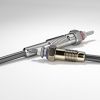Also known as antifreeze, coolant plays a pivotal role in regulating your engine's temperature in both hot and cold weather. Therefore, no matter what time of year, it is something all drivers should be regularly checking.
This guide looks at what engine coolant does to your vehicle, what to look for if it is leaking, and how to repair common problem.
What is engine coolant?
Engine coolant is a fluid added to the engine's cooling system that helps regulate its temperature.
It plays a vital role in maintaining the engine's temperature within the optimal range of the specific make and model, preventing it from overheating or freezing. It is something that helps keep a car in the best condition possible year-round.
Most coolants are pre-mixed with antifreeze, but you should check the label to ensure this is the case. The coolant is a mixture of water, ethylene glycol or propylene glycol – or a combination of the three. All drivers should regularly check coolant and top up as needed.
Always refer to the vehicle's owner's manual for specific recommendations regarding the type of coolant to use.
If you are unsure what is the best coolant for your car, speak with a mobile mechanic or your local approved garage.
What causes engine coolant leak?
Poor maintenance, driving without servicing, plus general wear and tear are all linked to coolant leaks.
Coolant leaks are specifically caused by:
- Cracks within the radiator hose, sealant, and connectors
- Radiator wear and tear
- Damaged head gasket
- Small holes in the radiator caused by damage from other components or something getting into the engine
- Radiator cap broken or missing
Why is engine coolant important?
The primary function of engine coolant is to regulate the temperature of the engine.
During combustion, the engine generates a significant amount of heat, which the coolant absorbs and carries away from the engine to prevent it from overheating.
It also contains antifreeze properties, such as ethylene glycol or propylene glycol, which prevent the liquid from freezing in colder temperatures.
The fluid also helps maintain a healthy engine with corrosion inhibitors that protect the various components of the cooling system, such as the radiator, water pump, and engine.
By extending the life of these components, it will save the owner a large bill to fix these issues – which can end up being quite expensive.
Car ownership comes with many challenges, and regular maintenance is something everyone should be doing.
How does engine coolant work?
Coolant circulates through the engine and absorbs heat generated during the combustion process, and the continued use of the engine throughout the length of the drive.
The fluid in the coolant system carries the heat to the radiator, where it dissipates into the air – therefore regulating the temperature and keeping the engine in optimal condition.
It also provides a safety feature of keeping the engine from overheating. However, in colder, wintry weather, the anti-freeze part of the fluid prevents the coolant from freezing.
Keep your engine running smoothly
The RAC recommends regular oil changes help keep your engine running smoothly and extend its life. Book an RAC Mobile Mechanic today.


Dangers of driving with engine coolant leak
Driving with a coolant leak can cause serious damage to your vehicle. This includes:
- Engine overheating: If the coolant drops below the minimum required level after the engine heats up, there will not be sufficient fluid to cool the components. This could result in overheating and ultimately engine failure
- Head gasket problems: Low coolant can result in head gasket issues. If this happens the vehicle could experience reduced performance or complete engine failure
Some vehicles will have low coolant car dashboard warning light which will look like a thermometer in liquid. It is not recommended to wait until this warning light is illuminated before checking your coolant, as the engine may have already suffered severe damage by the time this symbol appears on your vehicle's dashboard.
Knowing what to do if your car is overheating is important for all car owners.
Engine coolant leak repair
If the engine of your vehicle is leaking coolant then you should have it inspected by a professional mechanic. Due to the risk of overheating and breakdown, a car with a coolant leak may not be safe to drive. In this instance, call a mobile mechanic.
In some cases, it may be possible to repair the coolant leak. A qualified professional should be trusted to carry out the following steps:
- Open the bonnet, identify the radiator and start the engine
- Use radiator sealant on the areas where the leak is happening
The engine must be running, but the coolant must be cold when carrying out the fix. If this doesn’t resolve the issue, then the radiator will need to be removed and either have more extensive work done on it – or it will need to be replaced.
Engine coolant leak repair cost
Engine coolant leaks can be quite simple fixes. Prices can range from around £50 to £300, depending on the make, model, age, and type of vehicle.
If the radiator needs to be removed and have more extensive work carried out to fix the issue, then the bill could be more than £1,000.
Replacing a car radiator can range from £400 to more than £1,500.
What engine coolant do I need for my car?
If you are looking to top up the engine coolant in your car, then it is important to get the correct one for your vehicle.
Check your car owner’s manual, which will outline the types that your engine can use.
Find them here at RAC Shop.
Car troubles?
Book a diagnostic test with us today. RAC Mobile Mechanics will check your car for faults, talk you through any repairs you might need, and give you a report for your records.












